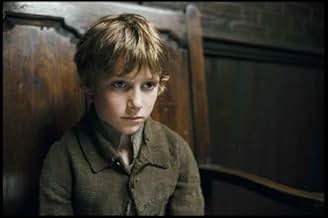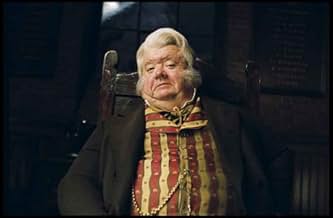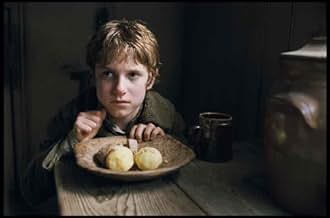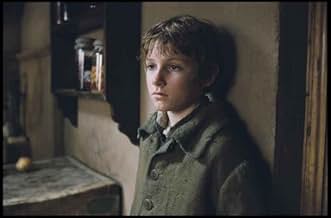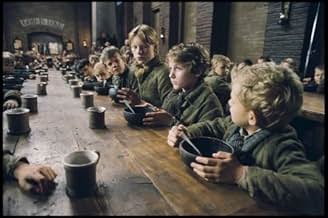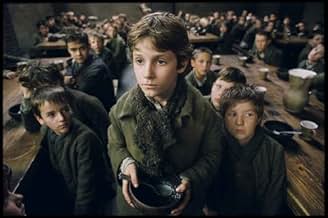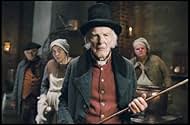AVALIAÇÃO DA IMDb
6,8/10
35 mil
SUA AVALIAÇÃO
Um órfão conhece um carteirista nas ruas de Londres, após o encontro ele se junta a um bando de meninos que são treinados para roubar a seu mestre.Um órfão conhece um carteirista nas ruas de Londres, após o encontro ele se junta a um bando de meninos que são treinados para roubar a seu mestre.Um órfão conhece um carteirista nas ruas de Londres, após o encontro ele se junta a um bando de meninos que são treinados para roubar a seu mestre.
- Direção
- Roteiristas
- Artistas
- Prêmios
- 2 vitórias e 4 indicações no total
Joe Tremain
- Hungry Boy
- (as Joseph Tremain)
- Direção
- Roteiristas
- Elenco e equipe completos
- Produção, bilheteria e muito mais no IMDbPro
Avaliações em destaque
Adapted from the classic Dickens tale, Oliver Twist is the story of an idealistic orphan struggling to survive in a savage adult world. A world where hypocrisy, greed and cunning are celebrated and there are only rare glimpses of compassion.
The film focuses on the key events of the Dickens novel, excluding many of the subplots and associated characters. It opens with Oliver's (Barney Clark) arrival at the workhouse of "Please Sir, can I have some more" fame and follows his escape to London and its dingy underworld. Here he falls in with a band of pickpockets led by Fagin (Ben Kingsley) - a central character typifying hypocrisy, greed and cunning - but finds salvation in the form of Mr Brownlow (Edward Hardwicke) who recognizes the goodness in Oliver and endeavors to extract him from his, albeit unsuccessful, life of thievery.
As he did with his award-winning, "The Pianist", Polanksi drew on his own life experiences as an orphan in the ghettos in World War II to recreate certain moods. Grim, grimy and often claustrophobic, "Oliver Twist" startlingly depicts a callous world where children live at the whim of ruthless, self-serving adults. But the horror of this dark, unforgiving world is relieved by the inclusion of humour and banter throughout, making the film both captivating and entertaining.
As Oliver, Barney Clark exemplifies the helplessness of an innocent at the mercy of strangers and being manipulated for their benefit. As noted by Mr Sowerberry, the undertaker, "There's an expression of melancholy in his face, my dear, which is very interesting. He'd make a delightful mute". And mute and incapacitated - be it through hunger, illness, injury and/or fear - he is for much of the film. Other than a surprising brief show of defiance that takes him from the coal shed and sets him on the road to London, there is little evidence of any determination, strength or willfulness at all in this Oliver. But unfortunately there is little to endear him either and the film suffers for it.
Harry Eden has more depth and is much more compelling as the Artful Dodger. Plucky and likable, his struggle with the consequences of his betrayal of Nancy (Leanne Rowe) is agonising. Ben Kingsley is masterful and almost unrecognizable as Fagin. Depicted as pure evil in the novel, Polanksi strives to give this character humanity and meaning. The result is a foul, exploitative, groveling survivor a desperate and pitiful villain, but not a completely heartless one.
The elimination of many of the twists of the novel means that this film may disappoint viewers familiar with the intriguing undercurrents of Dickens' plot and richness of his characters' and their relationships. The only incredible discovery that Oliver makes in this version is that there is a better life to either the workhouse or the den of thieves.
While adaptation to film necessitates simplification of the story and as Polanksi points out "For today's taste, you need to abandon a certain amount of melodrama that was very typical for the period", it is easy to feel that in this paring down we have been left with an entertaining adventure set in 19th century Britain. When it comes to this Oliver, less is not more.
The film focuses on the key events of the Dickens novel, excluding many of the subplots and associated characters. It opens with Oliver's (Barney Clark) arrival at the workhouse of "Please Sir, can I have some more" fame and follows his escape to London and its dingy underworld. Here he falls in with a band of pickpockets led by Fagin (Ben Kingsley) - a central character typifying hypocrisy, greed and cunning - but finds salvation in the form of Mr Brownlow (Edward Hardwicke) who recognizes the goodness in Oliver and endeavors to extract him from his, albeit unsuccessful, life of thievery.
As he did with his award-winning, "The Pianist", Polanksi drew on his own life experiences as an orphan in the ghettos in World War II to recreate certain moods. Grim, grimy and often claustrophobic, "Oliver Twist" startlingly depicts a callous world where children live at the whim of ruthless, self-serving adults. But the horror of this dark, unforgiving world is relieved by the inclusion of humour and banter throughout, making the film both captivating and entertaining.
As Oliver, Barney Clark exemplifies the helplessness of an innocent at the mercy of strangers and being manipulated for their benefit. As noted by Mr Sowerberry, the undertaker, "There's an expression of melancholy in his face, my dear, which is very interesting. He'd make a delightful mute". And mute and incapacitated - be it through hunger, illness, injury and/or fear - he is for much of the film. Other than a surprising brief show of defiance that takes him from the coal shed and sets him on the road to London, there is little evidence of any determination, strength or willfulness at all in this Oliver. But unfortunately there is little to endear him either and the film suffers for it.
Harry Eden has more depth and is much more compelling as the Artful Dodger. Plucky and likable, his struggle with the consequences of his betrayal of Nancy (Leanne Rowe) is agonising. Ben Kingsley is masterful and almost unrecognizable as Fagin. Depicted as pure evil in the novel, Polanksi strives to give this character humanity and meaning. The result is a foul, exploitative, groveling survivor a desperate and pitiful villain, but not a completely heartless one.
The elimination of many of the twists of the novel means that this film may disappoint viewers familiar with the intriguing undercurrents of Dickens' plot and richness of his characters' and their relationships. The only incredible discovery that Oliver makes in this version is that there is a better life to either the workhouse or the den of thieves.
While adaptation to film necessitates simplification of the story and as Polanksi points out "For today's taste, you need to abandon a certain amount of melodrama that was very typical for the period", it is easy to feel that in this paring down we have been left with an entertaining adventure set in 19th century Britain. When it comes to this Oliver, less is not more.
Roman Polanski never ceases to amaze me at all the things he can do. He can make so many different kinds of films well. His range is truly extraordinary. The man who gave us Chinatown, Pianist, Rosemary's Baby has now directed Oliver Twist. I've seen most of the versions of Twist but this is by far the best. David Leans version is often talked about but it is overpraised. It tends to be overly sentimental an very slow in certain places. I'm not for fast moving movies but his version can be quite dull at times. Polanski's film has updated a great story with lush photography of pastoral settings and the narrative moves briskly. He manages to develop the characters quite well despite the pace. The acting from all is superb especially Ben Kingsley who is barely recognizable. I've never been a fan of great books that have been adapted to film but Polanski seems to have a real knack for this sort of thing. He filmed Tess (also an adaptation) 25 years back with an Academy award nominated direction. That film is one of my all time favorites but Oliver Twist is even better. Polanski seems to get better with age. I can't wait to see what he does next.
Roman Polanski's film is an authoritative take on Dickens' classic. It is expertly paced, slowly immersing the viewer into the plight of the young orphan and its predicament in Victorian England. Through a meticulous period reconstruction, superb acting, and effective characterization (all the secondary characters are memorable), the typically Dickensian theme of the survival of Innocence against all odds is dramatized with utter conviction. The omission of the excessively melodramatic elements from the original story (Oliver's family back-story for instance) contributes greatly to the story's strength by minimizing any trace of implausibility or mawkishness, thus providing a wide-ranging portrait of the Victorian society with its intrinsic inequalities and its rather warped sense of justice. The visuals are splendid and the prevalent detached and non-judgmental approach to an easily emotive story is simply the signature of master director Roman Polanski, who is functioning here on top form.
Polanski is the kid of guy who likes to dance on the edge. A mixture of clown, genius and artist who has suffered personal tragedy and humiliation but one who keeps cranking amazing films. This Oliver Twist is no exception. Polanski has reworked the story and taken out the 19th century coincidences, e.g., the highly improbable fact that Oliver is Brownlow's grandson and the business with the portrait of Oliver's mother, given the old tale a fresh coat of paint with new amazing character actors such as Leanne Rowe, a young and thoroughly charming Nancy, Henry Eden, a scamp of a Dodger, Jamie Forman, a repulsive Bill Sykes with no redeeming features whatsoever and the veteran Edward Hardwicke as Brownlow. But, it's young Barney Clark who steals the show. In past versions, Oliver is merely a device upon which the other array of characters are hung. We'll all remember Sir Alec Guinness, Richard Dreyfus and Ron Moody's Fagin, Oliver Reed and Robert Newton's Bill Syke, Elijah Wood, Anthony Newley and Jack Wild's Dodger but who were the Olivers? We will remember young Master Barney Clark in this marvelous, intriguing and eye-pleasing Oliver.
There was little that Charles Dickens didn't know about human nature. Who better to interpret his work for the screen than the similarly gifted Roman Polanski.
Polanski's film allows everyone their humanity. Even the extras who people the immaculately designed sets, seem to have a life outside of this film. Ben Kingsley's performance as Fagin is not held in aspic in old age, but is full of hints about his earlier life. Oliver's sufferings seem to mirror that of children in many places and in all times. When it is alleviated it is not by those worldly motivations of charity or civil duty. While a carriage full of prosperous people studiously ignore his plight, a poor old woman who has little herself cares for him. While the wealthy city is content for him to die on the street, a criminal feeds him. When Oliver finally takes his place in the middle class, a priggish religiosity reminds us of Victorian society's cure for criminality. In the end Polanski knows and Dickens asserts that individual decency and humanity alone provide hope.
Polanski's film allows everyone their humanity. Even the extras who people the immaculately designed sets, seem to have a life outside of this film. Ben Kingsley's performance as Fagin is not held in aspic in old age, but is full of hints about his earlier life. Oliver's sufferings seem to mirror that of children in many places and in all times. When it is alleviated it is not by those worldly motivations of charity or civil duty. While a carriage full of prosperous people studiously ignore his plight, a poor old woman who has little herself cares for him. While the wealthy city is content for him to die on the street, a criminal feeds him. When Oliver finally takes his place in the middle class, a priggish religiosity reminds us of Victorian society's cure for criminality. In the end Polanski knows and Dickens asserts that individual decency and humanity alone provide hope.
Você sabia?
- CuriosidadesThe set was so huge that director Roman Polanski rode around it on a motorized scooter.
- Erros de gravaçãoFlipped shot: At 46:55, after Oliver is punched in the face while running from the crowd, the lettering on a hand held sign ('ELECTION') is backwards.
- Citações
Oliver Twist: Please, sir, I want some more.
- Versões alternativasSPOILER: Footage of the beating of Nancy from Bill was cut in the UK to obtain a "PG" rating.
- ConexõesFeatured in Troldspejlet: Episode #35.9 (2006)
Principais escolhas
Faça login para avaliar e ver a lista de recomendações personalizadas
- How long is Oliver Twist?Fornecido pela Alexa
Detalhes
- Data de lançamento
- Países de origem
- Central de atendimento oficial
- Idioma
- Também conhecido como
- Oliver Twist: Cậu Bé Mồ Côi
- Locações de filme
- Praga, República Tcheca(only studio)
- Empresas de produção
- Consulte mais créditos da empresa na IMDbPro
Bilheteria
- Orçamento
- US$ 60.000.000 (estimativa)
- Faturamento bruto nos EUA e Canadá
- US$ 2.080.321
- Fim de semana de estreia nos EUA e Canadá
- US$ 68.447
- 25 de set. de 2005
- Faturamento bruto mundial
- US$ 42.580.321
- Tempo de duração2 horas 10 minutos
- Cor
- Mixagem de som
- Proporção
- 2.35 : 1
Contribua para esta página
Sugerir uma alteração ou adicionar conteúdo ausente







